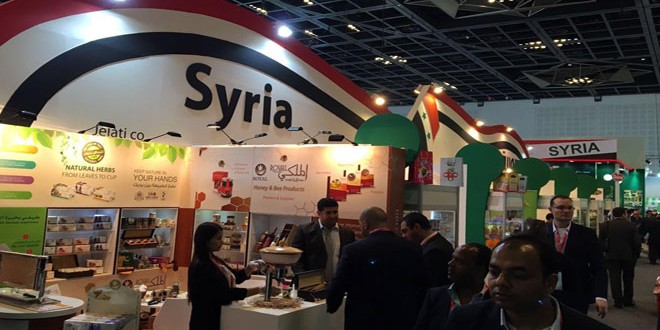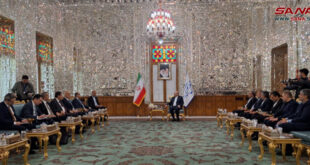Damascus, SANA – Despite the coercive unilateral sanctions imposed on the Syrian people, Syria has exported up to 750 products, mainly foodstuff, to 109 Arab and European states in 2017 and 2018, according to a study conducted by the Syrian Exporters Union.
The massive damage inflicted upon the industrial sector due to the crisis did not deter the Syrian food manufacturers from continuing production with local or imported raw materials in order to meet the needs of local markets and export part of their products to foreign markets.
Member of Damascus and its Countryside Industry Chamber Office, Talal Qala’aje, stressed that the comparative advantage of Syrian food products has contributed to making our exports take the lead and compete their branded counterparts, adding that these flavoursome products include apricot jam, tomato paste, olive oil, almond, cumin, aniseed and Awassi meat.
He pointed out that the good manufacturing practices, conformity with established international standards and the special attention paid to packaging process promote the competitiveness of Syrian food products and increase the demand for them.
Qala’aje called for reducing import tariffs on raw materials used in food manufacturing as it reflects positively on its competitiveness in terms of achieving added value, providing job opportunities, meeting requirements of local market and exporting the surplus.
He underlined the efforts exerted by the Chamber, in coordination with other commerce and industry chambers and the Syrian Exporters Union, to hold exhibition for Syrian products abroad such as in Jordan, Lebanon, Iraq, Libya and Algeria and open centers for Syrian exports in different foreign markets.
For his part, Chairman of Syrian Exporters Union, Mohammed al-Sawwah, expected an increase in Syria’s exports throughout the next year given that the reopening of Nassib border crossing with Jordan and the anticipated reopening of border crossings with Iraq, noting that all these measures came within the governmental support strategy for exportation in order to guarantee markets for Syrian products and increase the volume and value of exports.
R. Raslan/ Ghossuon
 Syrian Arab News Agency S A N A
Syrian Arab News Agency S A N A




